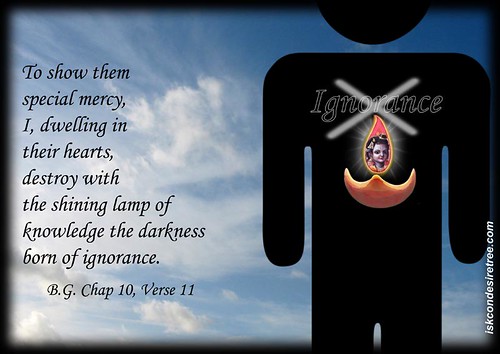According to the opinion of expert followers of Vedic rites, there are different types of benedictions in terms of religiosity, economic development, sense gratification and liberation. These four principles are known as catur-vargas. Of all the catur-vargas, the benediction of liberation is considered to be the highest in this material world. To be enabled to cross over material nescience is known as the highest puruṣārtha, or benediction for the human being. But Dhruva Mahārāja wanted a benediction which surpasses even the highest puruṣārtha, liberation.

He wanted the benediction that he might constantly remember the lotus feet of the Lord. This stage of life is called pañcama-puruṣārtha. When a devotee comes to the platform of pañcama-puruṣārtha, simply engaging in devotional service to the Lord, the fourth puruṣārtha, liberation, becomes very insignificant in his eyes. Śrīla Prabodhānanda Sarasvatī has stated in this connection that for a devotee liberation is a hellish condition of life; as for sense gratification, which is available in the heavenly planets, the devotee considers it to be a will-o'-the-wisp, having no value in life. Yogīs endeavor to control the senses, but for a devotee controlling the senses is no difficulty at all. The senses are compared to serpents, but for a devotee the serpents' poison teeth are broken. Thus Śrīla Prabodhānanda Sarasvatī has analyzed all kinds of benedictions available in this world, and he has clearly declared that for a pure devotee they are all of no significance.
Dhruva Mahārāja was also a mahā-bhāgavata, or a first-class pure devotee, and his intelligence was very great (mahā-matiḥ). Unless one is very intelligent, one cannot take to devotional service, or Kṛṣṇa consciousness. Naturally, anyone who is a first-class devotee must be a first-class intelligent person and therefore not interested in any kind of benediction within this material world. Dhruva Mahārāja was offered a benediction by the king of the kings. Kuvera, the treasurer of the demigods, whose only business is to supply immense riches to persons within this materialistic world, is described as the king of kings because unless one is blessed by Kuvera one cannot become a king. The king of kings personally offered Dhruva Mahārāja any amount of riches, but he declined to accept them. He is described, therefore, as mahā-matiḥ, very thoughtful, or highly intellectual.

- Srimad Bhagavatam 4.12.8 Purport

He wanted the benediction that he might constantly remember the lotus feet of the Lord. This stage of life is called pañcama-puruṣārtha. When a devotee comes to the platform of pañcama-puruṣārtha, simply engaging in devotional service to the Lord, the fourth puruṣārtha, liberation, becomes very insignificant in his eyes. Śrīla Prabodhānanda Sarasvatī has stated in this connection that for a devotee liberation is a hellish condition of life; as for sense gratification, which is available in the heavenly planets, the devotee considers it to be a will-o'-the-wisp, having no value in life. Yogīs endeavor to control the senses, but for a devotee controlling the senses is no difficulty at all. The senses are compared to serpents, but for a devotee the serpents' poison teeth are broken. Thus Śrīla Prabodhānanda Sarasvatī has analyzed all kinds of benedictions available in this world, and he has clearly declared that for a pure devotee they are all of no significance.
Dhruva Mahārāja was also a mahā-bhāgavata, or a first-class pure devotee, and his intelligence was very great (mahā-matiḥ). Unless one is very intelligent, one cannot take to devotional service, or Kṛṣṇa consciousness. Naturally, anyone who is a first-class devotee must be a first-class intelligent person and therefore not interested in any kind of benediction within this material world. Dhruva Mahārāja was offered a benediction by the king of the kings. Kuvera, the treasurer of the demigods, whose only business is to supply immense riches to persons within this materialistic world, is described as the king of kings because unless one is blessed by Kuvera one cannot become a king. The king of kings personally offered Dhruva Mahārāja any amount of riches, but he declined to accept them. He is described, therefore, as mahā-matiḥ, very thoughtful, or highly intellectual.

- Srimad Bhagavatam 4.12.8 Purport
No comments:
Post a Comment